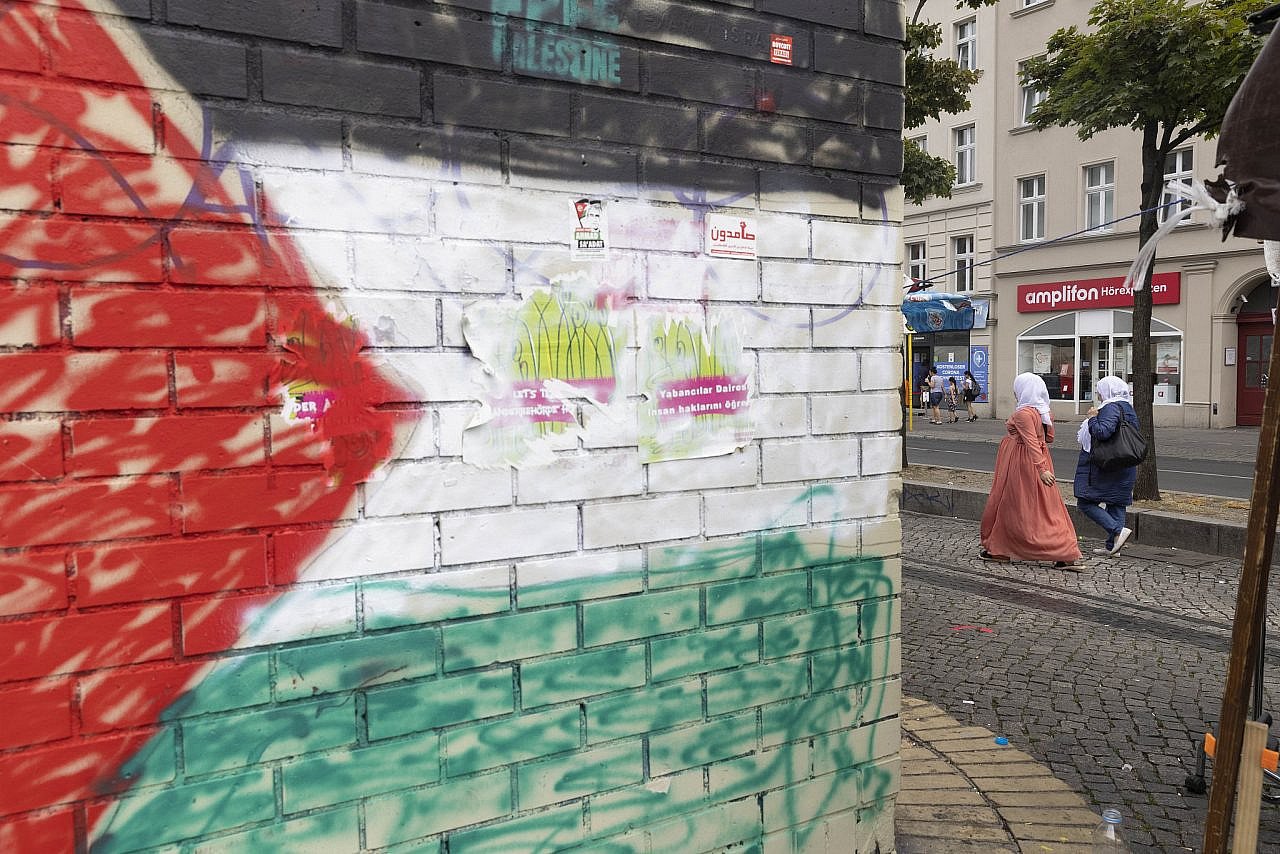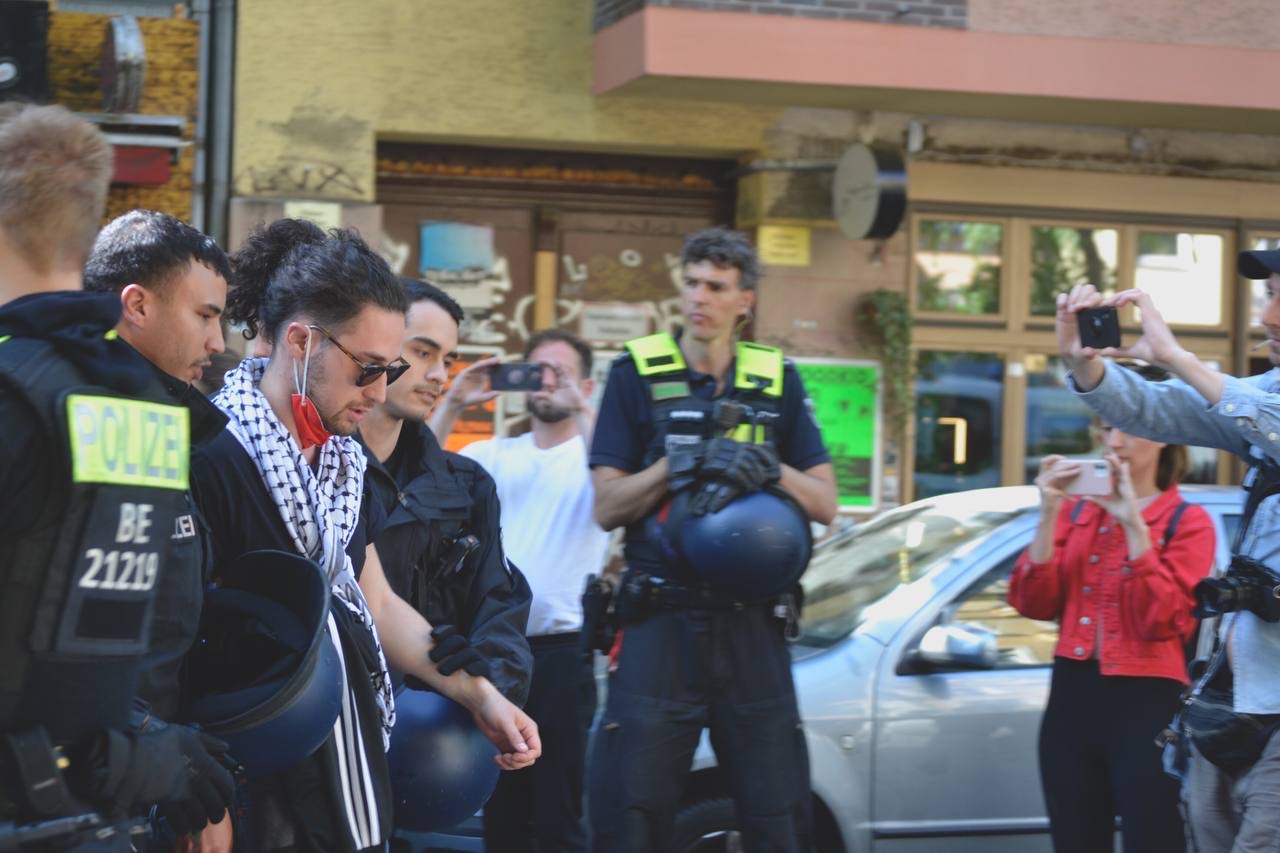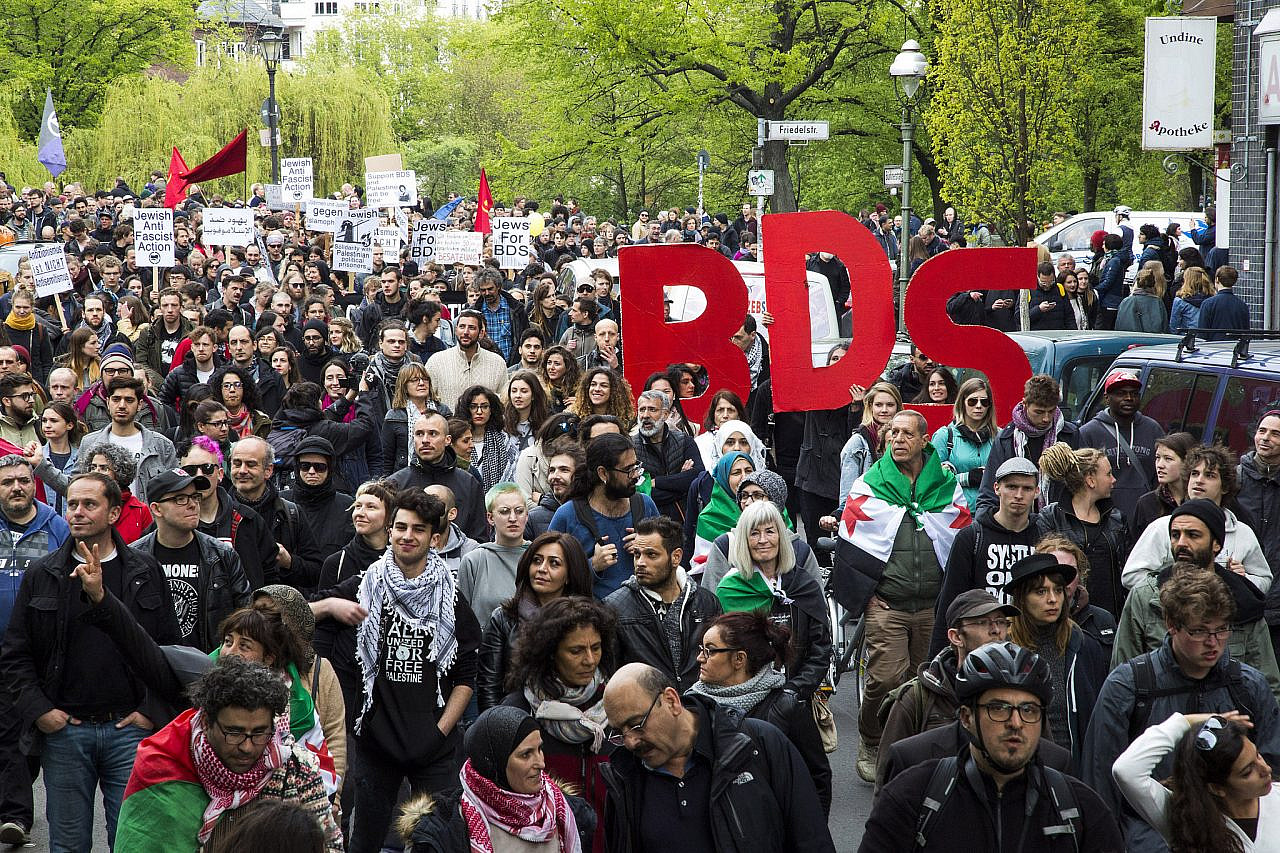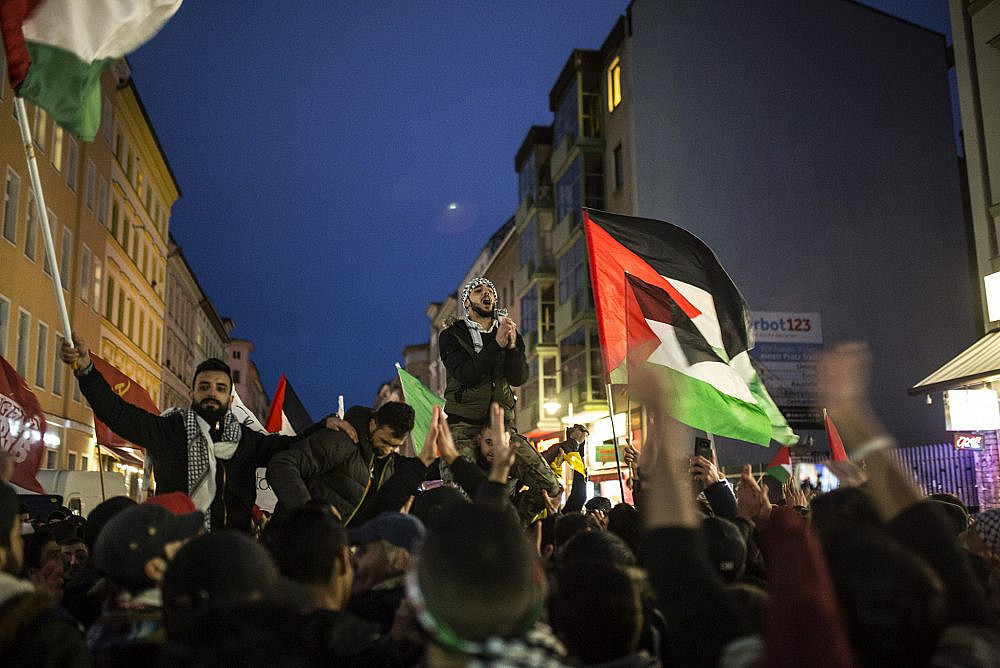A new report published by the German Conference of Interior Ministers (IMK) that focuses on “prevention and intervention against Israel-related antisemitism” is pushing for further crackdowns on pro-Palestine solidarity, and even discusses moving toward the criminalization of this kind of speech and activism.
Authored by one of the IMK working groups, and adopted by the Conference earlier this month, the report consistently conflates anti-Zionism with antisemitism by employing the controversial IHRA definition of antisemitism. It includes specific suggestions, such as urging schools to show their students a more positive view of Israel in the classroom, and categorizes Amnesty International’s recent report on Israeli apartheid as “antisemitic.” The report even suggests prohibiting maps that “question Israel’s right to exist”; whether this includes maps of historic Palestine remains unclear.
The decisions of the IMK are not immediately legally binding, such that the report is not currently actionable. But the Conference, made up of interior ministers and senators from Germany’s 16 states, plays an important role in coordinating the activities of the country’s local governments, and its resolutions are intended to be implemented at the state level. Although this implementation is not the responsibility of the IMK, its resolutions are politically binding, as they must be passed unanimously according to the Conference’s rules.

IMK’s own informational document details that failure to abide by their resolutions would “shatter the foundations of collegial and trusting cooperation [between states] in the future.” As a rule, the state-level interior ministries proceed in accordance with IMK agreements, and they report to each other on the fates of agreements and measures taken.
In a statement to +972, Amnesty International said it “stands against antisemitism, which is antithetical to human rights. We oppose discrimination, racism and hate crime in all forms, including against Jews or people perceived as Jewish. All of Amnesty’s criticism of the Israeli government is based in international law, and on evidence of the great harm and suffering Israel’s policies cause to Palestinians. Amnesty criticizes the Israeli government, not the Israeli people or the Jewish people.”
The IMK’s spokesperson did not respond to the author’s request for comment.
‘A delusional view of the reality of occupation’
The report singles out the Boycott, Divestment, and Sanctions (BDS) movement, labeling it dangerous and antisemitic, and claiming that it consists of “foreign extremists, Islamist terrorist organizations and left-wing extremist groups” — a claim that has been heavily pushed by the Israeli government. It further accuses the BDS movement of “playing down Arab nationalist and Islamist antisemitism and terror in the Middle East” by justifying this rhetoric through academia. “Sympathizers of the BDS campaign can also be found in the art and culture scene as well as within the scientific community,” the report continues.
Germany’s crackdown on the BDS movement has been intensifying for years, accelerated by a 2019 Bundestag resolution that classifies it as inherently antisemitic, essentially barring organizations that support the boycott from accessing public funds and public spaces. The resolution has enabled universities, state governments, and public institutions to deny Palestinians the right to free speech and assembly.
That censorship has contributed to a swell of anti-Palestinian political sentiment and policy in Germany, the supporters of which believe it to be justified by Germany’s historical responsibility toward Israel due to the Holocaust. The result is that any criticism of Israeli oppression of Palestinians is often immediately deemed problematic.
“It is really a dangerous development in an authoritarian direction,” said Kerem Schamberger, a German communication scientist and political activist, of the new report. “The adoption of this political, instrumentalized definition of antisemitism by the state, its institutions, and its ruling politicians is a delusional view of the reality of the occupation, shielding any criticism of it.
“They are trying to criminalize and punish any pro-Palestinian act,” Schamberger continued. “They did so more generally with the anti-BDS resolution, but that was just the start. Now the states are trying to establish specific tools that they can use to target international solidarity and pro-Palestinian activists.”
‘The same old baseless arguments’
In order to counter the BDS movement, the working group that drafted the recent report recommended developing “adequate educational media and educational formats for schools,” as well as training for educators, to “convey a realistic image of Israel.”
Earlier this month, +972 reported on the German education system’s aggressive push to adopt a pro-Israel narrative in classrooms. Not only has this led to a lack of critical conversation among students, it also discourages any embrace of pro-Palestinian dialogue, often resulting in a hostile learning environment for Palestinians. According to the report, however, the IMK believes that an even stronger pro-Israel agenda is needed in schools, as well as “intensif[ied]” exchange programs with Israel.

Yet the report doesn’t just push for more ways to combat any pro-Palestinian solidarity. It also advocates harsher punishments for Palestine activism, aiming for these to be “as universal as possible.” The working group seeks to develop a model national guideline that can be used by antisemitism commissioners at the federal and state level to monitor and track antisemitic acts across the country.
The IMK also suggests “creating a new legal basis” to be able to criminalize activities against Israel or “to criminally prosecute [pro-Palestine groups’] right to exist,” including legal regulations against pro-Palestine clubs and activities under the guise of “banning antisemitic gatherings.”
Germany is already committed to blocking pro-Palestinian gatherings. Earlier this year, Berlin police arrested and detained 170 people during Nakba Day demonstrations, some of whom had done nothing more than hold a Palestinian flag or wear a keffiyeh. Berlin police also banned a vigil for the killing of Shireen Abu Akleh that had been planned by Jewish organizers – all in the name of fighting antisemitism.

“This delineates yet another new attempt, nevertheless deploying the same-old baseless arguments, to chill free expression of Palestinian rights advocacy and legitimate demands for accountability through non-binding policy guidance,” Alice Garcia, the advocacy and communication manager at the European Legal Support Center, told +972.
“Of course, such measures would be difficult to approve through legislative proposals given their lack of substance and their failure to respect the fundamental rights to freedom of expression and freedom of assembly,” Garcia said. “This document is therefore one of the means by which the promoters of an anti-Palestinian discourse are attempting to impose a new category of acts that they would like to see become de facto illegal; thus it must be strongly condemned and challenged.”
Pushing back
Some groups have indeed been condemning and challenging rising German anti-Palestinianism. Ahmed Abed, a Palestinian-German lawyer, was recently involved in a case that exemplifies this effort. The Palestine Committee Stuttgart, a group that supports BDS, had their bank account terminated by Landesbank Baden-Württemburg (LBBW) because of the group’s anti-Zionist politics. Abed successfully helped the group get the account termination overturned – on April 26, the Stuttgart Regional Court ruled that LBBW’s actions were unjustified.
“[The court] declared that the BDS movement does not pose a threat to Jewish life in Germany,” Ahmed Abed told +972. Yet this seems to have had little impact on the authors of the report.

“The interior ministers are acting against their own constitution and against the Anti-Apartheid Convention to which Germany is committed,” Abed said of the report. “Human rights organizations are demanding sanctions because of Israeli apartheid, but peaceful forms of action like BDS are criminalized. Palestinians are to be prosecuted for statements such as ‘From the river to the sea, Palestine will be free,’ [for] the map of historic Palestine, or [over] BDS. The interior ministers simply ignore recent court decisions that do not allow this.”
Even Jewish scholars and artists from Israel are not happy with the direction things have been going in Germany over the past few years. In 2020, dozens of Jewish scholars and artists from Israel and elsewhere demanded the German government remove the Federal Antisemitism Commissioner, Felix Klein, from his position due to his “weaponization of antisemitism” against critics of Israel. “As an official representative of the German government, Mr. Klein is undermining the exercise of fundamental freedoms — this should deeply alarm your government, considering its commitment to democratic principles and the rule of law,” the letter read.
It is not yet clear what the implications of the IMK’s resolution will be, nor do we know how soon this language will become law in the states. Yet one thing is clear: it is becoming much harder to fight for Palestinian freedom in the supposedly democratic state of Germany.



